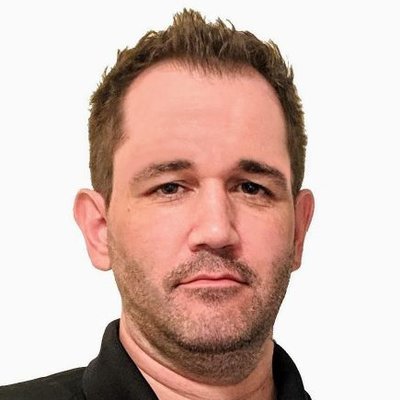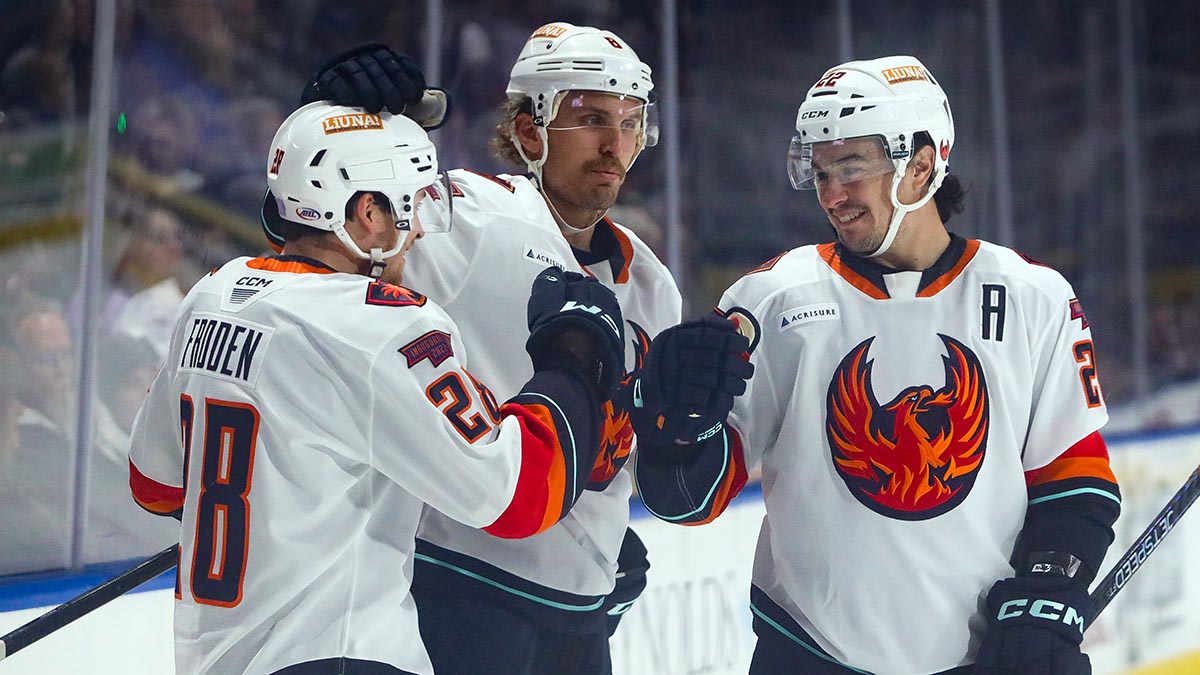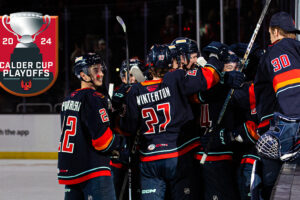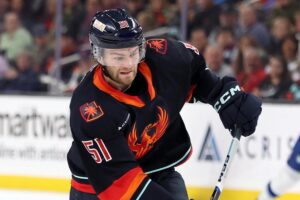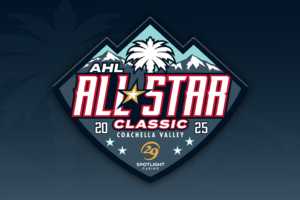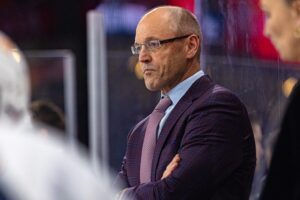📝 by Patrick Williams
Literally and figuratively, the road to the Coachella Valley Firebirds’ debut at Acrisure Arena this afternoon has been a long one in the making.
The AHL first granted a franchise to the Palm Springs, Calif., market more than three years ago, on Sept. 30, 2019. Bringing the National Hockey League’s top developmental circuit to a record 32 clubs, the team was established to serve as the AHL affiliate of the expansion Seattle Kraken. The ownership group included both the Kraken and Oak View Group, a worldwide firm headed by two of the most powerful names in entertainment, sports veteran Tim Leiweke and Irving Azoff, a member of the Rock and Roll Hall of Fame with more than 40 years in the music business managing acts like Fleetwood Mac, Journey, and the Eagles among many others.
While the Palm Springs region is most famous as a winter destination for people lured by its mild weather and stunning desert scenery, an AHL franchise also meant an opportunity to provide the area with a pro sports team to call its own. Located two hours inland from Los Angeles (traffic permitting), Palm Springs had limited experience with local pro sports. Pro tennis stages a major tournament each spring for two weeks in nearby Indian Wells. Major League Baseball’s California Angels held spring training in the area for 31 years, but that ended in 1992. The Angels also had a California League affiliate in Palm Springs for eight seasons before pulling out 29 years ago.
Original plans to build an arena in downtown Palm Springs did not materialize. In September 2020, the Kraken announced a new project more centrally located to the entire region, privately funded and erected on land alongside Interstate 10 in Palm Desert owned by the H.N. and Frances C. Berger Foundation, a local charitable group.
Perfect.
The move to bring hockey to the Coachella Valley was back in full swing. By June 2021, ground had been broken for a new 11,000-seat venue that could stage hockey, other sports, and music’s biggest acts. The building has elements of the mid-century modern look — think 1950s- and 60s-style design — in keeping with the architecture for which the area has long been renowned.
Off the ice, it was full-speed ahead on the building. On the ice, the arena delay meant that the Kraken would have to station their prospects elsewhere last season. They quickly struck a deal with the Florida Panthers to share the Charlotte Checkers for 2021-22.
To manage it all on the hockey side, the Kraken hired Troy Bodie as their AHL director of hockey operations. A veteran of 381 AHL games, plus another 159 in the NHL, Bodie knew the business from a player’s perspective. Following his retirement at the end of the 2014-15 season, he moved directly into management with the Toronto Maple Leafs organization, including three seasons as the club’s director of pro scouting.
Last season meant plenty of flights across North America for Bodie to keep up with Seattle’s prospects in Charlotte. All the while back in Palm Desert, the team got a moniker, debuted its jerseys, and got down to marketing itself and selling tickets.
But the work was only starting when last season wrapped up. Now the Kraken and Bodie had an AHL affiliate to launch. They had to build out an AHL roster, a task complicated by the organization only having two draft classes so far. Yet the organization managed to land the likes of Andrew Poturalski, who was coming off captaining the Chicago Wolves to a Calder Cup and back-to-back seasons as the AHL scoring champion. Reliable two-way forwards Jesper Froden and Cameron Hughes came west from the Boston Bruins organization. Hard-nosed forward John Hayden had 240 games of experience in the NHL. They were joined by defensemen Brogan Rafferty, Jimmy Schuldt, and Matt Tennyson, who grew up in California and has family ties to the Coachella Valley. That is a deep core to pair with Seattle’s growing base of young prospects.
However, Acrisure Arena’s construction timeline still meant that the Firebirds would have to spend more than two months wandering across the AHL map this season. The team set up in Seattle for training camp and the first three weeks of the regular season, including four “home” dates in Seattle and Everett.
Then came the migration south to the Coachella Valley. But even then, they had to endure a stretch of 16 more games on the road, with stops in Abbotsford, Tucson, Colorado, Calgary, San Diego, Henderson, San Jose, Bakersfield, Tucson once more and finally San Diego again. Impressively, at 14-5-3-0, the Firebirds own the best points percentage in the Western Conference (.705) before ever making their Palm Desert debut.
Here is a Sunday chat with Bodie on the massive logistical work that the organization took on leading up to today’s game with the Tucson Roadrunners:
ON THE PAST SIX MONTHS
“You usually get July, August off. July, August was an absolute grind, but it was a fun grind, right?
“You’re figuring out the logistics. Where are these players going to stay? How do you get a hotel for 35 people for two months? Any hotel would line up and help you if they have availability, but you know how it always works. This weekend is sold out.
“Everything takes so much time. Organizing. Shipping everyone’s luggage so it wasn’t bag fee after bag fee. It was just a ton of planning, and the Kraken gave us so much support and anything and everything we could have needed.
“[In Seattle], the Kraken took care of us. It still felt like we were kind of on the road. It was very temporary. It was really strange, but there’s a lot to say from our group about how well they handled it from a game standpoint, attitude.
“You’re getting a franchise off the ground, and these [players] did it right and really built the culture. It really could have gone another way, but I give [them] a ton of credit.”
ON THE LOGISTICAL PLANNING
“The transition down here was difficult. I rented a semi truck to ship everything down here. We transferred 20-some cars down here. And just getting into our building, getting settled, for the first two weeks we didn’t really feel settled. But at least we were down in this warm market.
“But it was still weekends on the road.”
ON CONTRACT NEGOTIATIONS WITH PLAYERS THIS PAST SUMMER
“We were up-front with everyone right off the start. We talked to agents. It was, ‘Listen, this is the situation. It’s not going to be the prettiest, but we’re going to do everything we can to make these players feel good.’
“We actually thought it was going to be quite a deterrent for players to sign with us, but the players bought in right away. There were no issues. We signed a lot of players that we went after right away. They’re not only willing to do it, but they backed it up once they got here, and they’ve been happy, and [I have] been real proud of them.”
ON STARTING TO SETTLE IN THE COACHELLA VALLEY
With the Coachella Valley being a winter community and resort, finding places to live was a challenge.
“I was terrified of these guys coming down November 6, looking for housing, and everyone being like, ‘Sorry.’
“So we actually helped [players] to find places. I was working all summer trying to get six-month leases, and then when the players get down, you transfer them to them. Some of the players took us up on that. But a lot of them just went ahead and found their own. It worked out a lot better than I thought. I was actually pretty scared of it.
“The players were really excited. Even when we were up in Seattle, they were finding homes. There are just such beautiful places to live down here. Once they end up getting down here, they were exploring the area. The palm trees. It’s sunny every day and 75 degrees. Obviously the weather was a big plus, not only for the players but their families as well.
“And then getting into our brand-new and NHL-quality first-class facility that’s been built here.”
ON DEALING WITH ONGOING CONSTRUCTION AT ACRISURE ARENA
While construction continued on Acrisure Arena leading up to its official opening this week, the Firebirds practiced at the Berger Foundation Iceplex adjacent to the arena’s main rink.
“I don’t know if people understood that we were a temporary occupancy situation with our practice facility, where we were allowed to practice and hang out and work out, but we had to be out in a certain amount of time. We couldn’t cross the lines into the non-occupied zone, which [was] the game rink, the general seating area, stuff like that.
“It was a strange situation, but the guys bought in. They worked hard. They trained hard and went on the road and did their business. The record speaks for itself for how well they’ve handled it.”
ON THE TAKEAWAY FROM THIS EXPERIENCE
“It was really a grind, but there was always this light at the end of the tunnel, which I knew the players saw. The coaches and us in the office here, we saw that light at the end of the tunnel, and it was bright, for sure.
“The players have been ecstatic with how things have gone. They just can’t wait for [today].”
TheAHL.com features writer Patrick Williams has been on the American Hockey League beat for nearly two decades for outlets including NHL.com, Sportsnet, TSN, The Hockey News, SiriusXM NHL Network Radio and SLAM! Sports, and was most recently the co-host of The Hockey News On The ‘A’ podcast. He was the recipient of the AHL’s James H. Ellery Memorial Award for his outstanding coverage of the league in 2016.